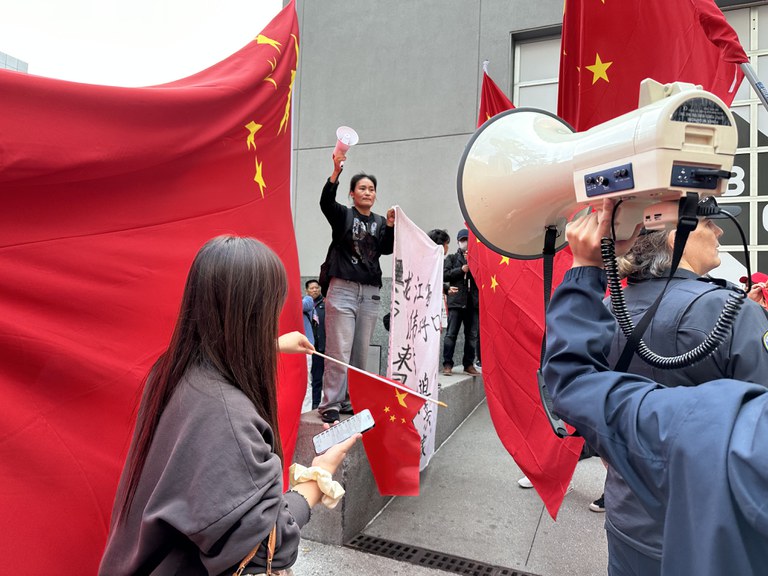China’s embassy and consulates in the United States bused hundreds of pro-Beijing counter-protesters to San Francisco last month to violently suppress demonstrations against Chinese President Xi Jinping’s visit, activists and a U.S. lawmaker said on Tuesday.
In many cases, the San Francisco Police Department stood idly by while the assaults were occurring, according to the activists.
Speaking at a media event organized by the Congressional-Executive Commission on China, the Tibetan, Uyghur, Chinese and Hong Konger activists said the pro-Beijing counter-protesters constantly harassed them and even assaulted them during Xi’s four-day visit to the city.
Xi was in San Francisco for the Asia-Pacific Economic Cooperation summit, during which he also met U.S. President Joe Biden in what the White House promoted as a chance for warmer U.S.-China ties.
On the streets of San Francisco, things were far less cordial, with pro-Beijing counter-protesters harassing any anti-Xi voices across the four days of the summit and beating many who did not flee, said Anna Kwok, executive director of the Hong Kong Democracy Council.
What she witnessed made her “heart ache,” she said, and had changed her mind about the scope of trans-national repression in America and, therefore, the safety of speaking out on U.S. soil.

“I thought the United States was a safe haven for me to continue my advocacy work, but last month proved me all wrong,” Kwok said. “I’m very sorry to say that I no longer feel safe to be in the United States, and I no longer feel safe to continue doing my advocacy work.”
“I urge authorities to conduct a thorough and extensive investigation into the violence waged against us,” she said. “Congress should also pass policies to combat transnational repression.”
‘I thought we were safe’
Wearing a black eye patch, Kaiyu Zhang said he fled from China to the United States earlier this year to escape political persecution, and decided to exercise his newfound freedoms by joining a protest against Xi’s arrival at San Francisco International Airport on Nov. 14.
After parking his car at a Costco about 10 minutes’ walk away from the protest, he said, about “a dozen young Chinese men” started following him – likely, he said, after hearing him speak Cantonese to a friend, which caused them to offer an expletive-ridden rant about Hong Kong.
“I thought we were safe in America,” Zhang said. So he replied with a similar collection of expletives about China’s soon-to-arrive president.
The next thing he knew, he recalled, he was thrown to the ground and was being beaten “violently” by the men. Another group of men arrived to join in at some point, he said, and he then lost consciousness. He later posted a video of the men onto the X social media platform.
“It was a well-organized and well-coordinated assault,” Zhang said. “The groups of thugs were wearing red headbands and red scarves to identify fellow thug members, and to coordinate with each other.”
Like Kwok, Zhang said his time in San Francisco opened his eyes.
He had once been surprised to meet other Chinese immigrants who still counsel others against publicly criticizing the Chinese Communist Party, even while in the United States.
“I was once angry with them,” he said. “Now I understand why.”
Police inaction
The activists spoke of the pervasiveness of the harassment.
Pema Doma, the executive director of Students for a Free Tibet, estimated about two dozen young Tibetan-Americans were assaulted by the pro-CCP counter-protesters during APEC.
Doma said the “thugs” appeared to be targeting young protesters – including following them home on the subway from protests – in order to scare the groups into disbanding or ending the anti-Xi protests.
“Chinese CCP agents were targeting individuals and picking them off from the group as if they were prey,” she said. “I was very proud that night when the student activists, some of them as young as 16 … decided they will stay at the protest regardless of the threats.”
The counter-protesters worked together to use large Chinese flags both as weapons – leveraging the poles to beat their targets – as well as covers to hide their violent activities from nearby police, she said.
In one particularly bad case, Doma recounted, a Tibetan-American mother alerted police to her son being beaten “about 50 feet away,” but they refused to intervene because it was obscured by the flags.

Instead, she said, police cautioned her not to stay away.
“I have never felt such disappointment as when the San Francisco Police Department told me ‘We cannot go there,’ and they actually restrained the mother from going to her own child,” she said. “I have never felt so powerless as a Tibetan-American person.”
RFA reporters in San Francisco last month witnessed a separate incident where a protester outside the Chinese president’s downtown hotel was surrounded by a group bearing large flags before being thrown to the ground and stomped on as police stood nearby.
Calls for investigation
Both the San Francisco Police Department and the Chinese Embassy in Washington did not respond to requests for comment from RFA.
Rep. Chris Smith, a Republican from New Jersey who serves as a co-chair of the Congressional-Executive Commission on China, told the news conference that he believed police on the scene were acting on orders “from above” and said an investigation was warranted.
“These claims, as well as the non-responsiveness of the San Francisco Police Department … must be investigated, as this marks an escalation of flagrant transnational repression on United States soil,” Smith said.

Zhou Fengsuo, a survivor of the 1989 Tiananmen Square massacre who helped organize the APEC protests against Xi, said he was no stranger to Beijing using violence “as a political tool” to silence critics.
But he said he was still shocked when it was allowed to occur in the United States, and in a way that was so well-organized by Beijing.
“These protester groups were flown from as far as New York City, with some well known CCP supporters leading the charge,” he said. “They directed these people to use flag posts to cover the protesters and to attack these protesters. They identify themselves with red scarves.”
“I heard witnesses describe the way San Francisco police stood by,” he said, adding it was not the first time pro-Beijing groups had attacked anti-CCP protesters on U.S. soil. “I was saddened, but not surprised.”



